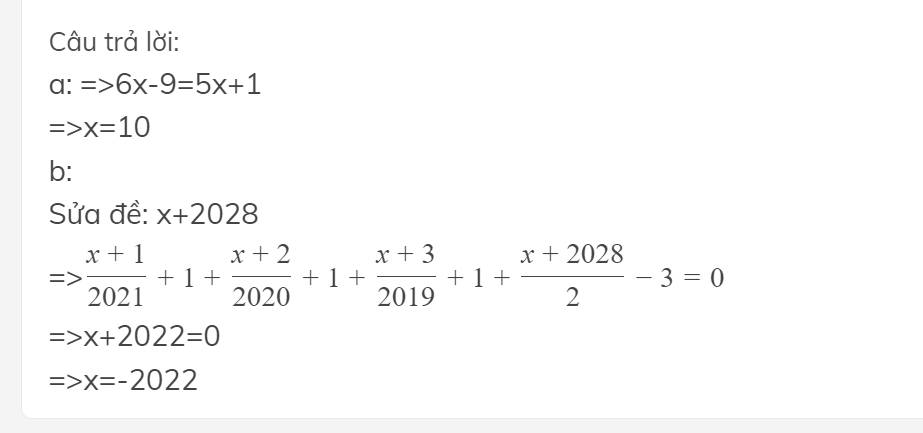2x+ 2x+1+ 2x+2+.....+2x+2019= 22023- 8
Hãy nhập câu hỏi của bạn vào đây, nếu là tài khoản VIP, bạn sẽ được ưu tiên trả lời.


Lời giải:
$2^x+2^{x+1}+2^{x+2}+...+2^{x+2019}=2^{x+2023}-8$
$2^x(1+2+2^2+...+2^{2019})=2^{x+2023}-8$
Xét:
$A=1+2+2^2+...+2^{2019}$
$2A=2+2^2+2^3+...+2^{2020}$
$\Rightarrow A=2A-A=2^{2020}-1$
Khi đó:
$2^x.A=2^{x+2023}-8$
$2^x(2^{2020}-1)=2^{x+2023}-2^3$
$2^x(2^{2023}-2^{2020}+1)-2^3=0$
$2^x(2^{2020}.7+1)=2^3$
$x$ ra số sẽ khá xấu. Bạn coi lại.


\(\frac{x}{x^2+9x+2019}=\frac{x^2+10x+2019}{x^2+8x+2019}\)
Ta thấy \(0\)không thỏa mãn phương trình trên.
Với \(x\ne0\)phương trình tương đương với:
\(\frac{1}{x+9+\frac{2019}{x}}=\frac{x+10+\frac{2019}{x}}{x+8+\frac{2019}{x}}\)
\(\Leftrightarrow\frac{1}{t+9}=\frac{t+10}{t+8}\)(\(t=x+\frac{2019}{x}\))
\(\Rightarrow\left(t+10\right)\left(t+9\right)=t+8\)
\(\Leftrightarrow t^2+18t+82=0\)
\(\Leftrightarrow\left(t+9\right)^2+1=0\)(vô nghiệm)
Vậy phương trình đã cho vô nghiệm.

Câu 1:
1: Ta có: \(P=\left(\dfrac{x^2}{x^2-3}+\dfrac{2x^2-24}{x^4-9}\right)\cdot\dfrac{7}{x^2+8}\)
\(=\left(\dfrac{x^2\left(x^2+3\right)}{\left(x^2-3\right)\left(x^2+3\right)}+\dfrac{2x^2-24}{\left(x^2-3\right)\left(x^2+3\right)}\right)\cdot\dfrac{7}{x^2+8}\)
\(=\dfrac{x^4+3x^2+2x^2-24}{\left(x^2-3\right)\left(x^2+3\right)}\cdot\dfrac{7}{x^2+8}\)
\(=\dfrac{x^4+5x^2-24}{\left(x^2-3\right)\left(x^2+3\right)}\cdot\dfrac{7}{x^2+8}\)
\(=\dfrac{x^4+8x^2-3x^2-24}{\left(x^2-3\right)\left(x^2+3\right)}\cdot\dfrac{7}{x^2+8}\)
\(=\dfrac{x^2\left(x^2+8\right)-3\left(x^2+8\right)}{\left(x^2-3\right)\left(x^2+3\right)}\cdot\dfrac{7}{x^2+8}\)
\(=\dfrac{\left(x^2+8\right)\left(x^2-3\right)}{\left(x^2-3\right)\left(x^2+3\right)}\cdot\dfrac{7}{x^2+8}\)
\(=\dfrac{7}{x^2+3}\)
Câu 2a đề sai, pt này ko giải được
2b.
\(P\left(x\right)=\left(2x+7\right)\left(x^2-4x+4\right)+\left(a+20\right)x+\left(b-28\right)\)
Do \(\left(2x+7\right)\left(x^2-4x+4\right)⋮\left(x^2-4x+4\right)\)
\(\Rightarrow P\left(x\right)\) chia hết \(Q\left(x\right)\) khi \(\left(a+20\right)x+\left(b-28\right)\) chia hết \(x^2-4x+4\)
\(\Leftrightarrow\left\{{}\begin{matrix}a+20=0\\b-28=0\end{matrix}\right.\) \(\Rightarrow\left\{{}\begin{matrix}a=-20\\b=28\end{matrix}\right.\)
3a.
\(VT=\dfrac{1}{1+x^2}+\dfrac{1}{1+y^2}=\dfrac{2+x^2+y^2}{1+x^2+y^2+x^2y^2}=1+\dfrac{1-x^2y^2}{1+x^2+y^2+x^2y^2}\le1+\dfrac{1-x^2y^2}{1+2xy+x^2y^2}\)
\(VT\le1+\dfrac{\left(1-xy\right)\left(1+xy\right)}{\left(xy+1\right)^2}=1+\dfrac{1-xy}{1+xy}=\dfrac{2}{1+xy}\) (đpcm)
3b
Ta có: \(n^3-n=n\left(n-1\right)\left(n+1\right)\) là tích 3 số nguyên liên tiếp nên luôn chia hết cho 6
\(\Rightarrow n^3\) luôn đồng dư với n khi chia 6
\(\Rightarrow S\equiv2021^{2022}\left(mod6\right)\)
Mà \(2021\equiv1\left(mod6\right)\Rightarrow2021^{2020}\equiv1\left(mod6\right)\)
\(\Rightarrow2021^{2022}-1⋮6\)
\(\Rightarrow S-1⋮6\)

=>\(\left(\dfrac{x+1}{2021}+1\right)+\left(\dfrac{x+2}{2020}+1\right)+\left(\dfrac{x+3}{2019}+1\right)+\left(\dfrac{x+2028}{2}-3\right)=0\)
=>x+2022=0
=>x=-2022

\(\dfrac{x-1}{2023}+\dfrac{x-2}{2022}=\dfrac{x-3}{2021}+\dfrac{x-4}{2020}\)
`<=>(x-1)/2023-1+(x-2)/2022-1=(x-3)/2021-1+(x-4)/2020-1`
`<=>(x-2024)/2023+(x-2024)/2022=(x-2024)/2021+(x-2024)/2020`
`<=>(x-2024)(1/2023+1/2022-1/2021-1/2020)=0`
`<=>x-2024=0(1/2023+1/2022-1/2021-1/2020>0)`
`<=>x=2024`
=>\(\left(\dfrac{x-1}{2023}-1\right)+\left(\dfrac{x-2}{2022}-1\right)=\left(\dfrac{x-3}{2021}-1\right)+\left(\dfrac{x-4}{2020}-1\right)\)
=>x-2024=0
=>x=2024


`2^(x) + 2^(x+1) + 2(x+2) + ... + 2^(x+2019) = 2^(2023) - 8`
Đặt `A = 2^(x) + 2^(x+1) + 2(x+2) + ... + 2^(x+2019)`
`2A = 2^(x+1) + 2^(x+2) + 2(x+3) + ... + 2^(x+2020)`
`2A - A = (2^(x+1) + 2^(x+2) + 2(x+3) + ... + 2^(x+2020)) - ( 2^(x) + 2^(x+1) + 2(x+2) + ... + 2^(x+2019))`
`A = 2^(x+2020) - 2^(x)`
`A = 2^x . (2^(2020) - 1)`
Mà `A = 2^(2023) - 8 = 2^3 . (2^(2020) - 1) `
`=> x = 3`
Vậy `x = 3`